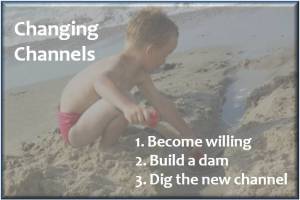 When I was in college I had to take a year of advanced math. The class met an hour a day, Monday through Friday. I did the best I could in class, paid attention, took detailed notes, and asked questions when I didn’t understand. But I quickly found that when I went home each night I could not do the homework. I spent hours trying to figure it out, reading the book, looking over my notes, to no avail. The next day the instructor moved on to something new — something that required an understanding of the previous day’s material. I was lost, and it was only the first week of class!
When I was in college I had to take a year of advanced math. The class met an hour a day, Monday through Friday. I did the best I could in class, paid attention, took detailed notes, and asked questions when I didn’t understand. But I quickly found that when I went home each night I could not do the homework. I spent hours trying to figure it out, reading the book, looking over my notes, to no avail. The next day the instructor moved on to something new — something that required an understanding of the previous day’s material. I was lost, and it was only the first week of class!
I discovered that there was a Math lab, where tutors were available to help, one-on-one. I found that if I went to the lab right after class every day and did the homework with the help of a tutor, I could learn the material and avoid getting behind. Sometimes the tutors had to find a different way of explaining the concepts to me. Other times we had to go over and over things in multiple ways in order for me to grasp the material. It was hard, and frustrating, but I knew that if I didn’t do whatever it took to learn it, it would just be that much more difficult the next day.
I have found the same pattern in my life since I graduated, but I didn’t recognize it right away. I have come to understand that when I need to learn new life skills the Lord will give me as many opportunities as I need to learn them. When I don’t learn from one experience, the Lord gives me another. Sometimes I don’t learn from an experience because, in my pride, I blame others for the circumstances or outcome. Other times I am unwilling to do the work I fear would be necessary to go through an experience so I either work around it or run away from it. There are times when I have needed multiple lessons before I finally have learned a new life skill. When I do master it, I can see how necessary it was for me to learn it! New opportunities open to me. I become a more useful servant to the Lord.
You have a personal tutor who plans your education — individualized and customized to your strengths and weaknesses — for the purpose of teaching you the life skills you will need to ascend to your eternal destiny. If you refuse or fail to learn the skill from one experience you will have as many opportunities as you need to learn it.
- Are you tired of facing the same challenges over and over?
- How have you reacted to these challenges in the past? Have you run away or blamed others?
- How can you embrace the opportunities the Lord is giving you, search for insight regarding the life skills you need to learn from challenging experiences and do the work necessary to master them?
- Are you willing to do this? What are you willing to do?















